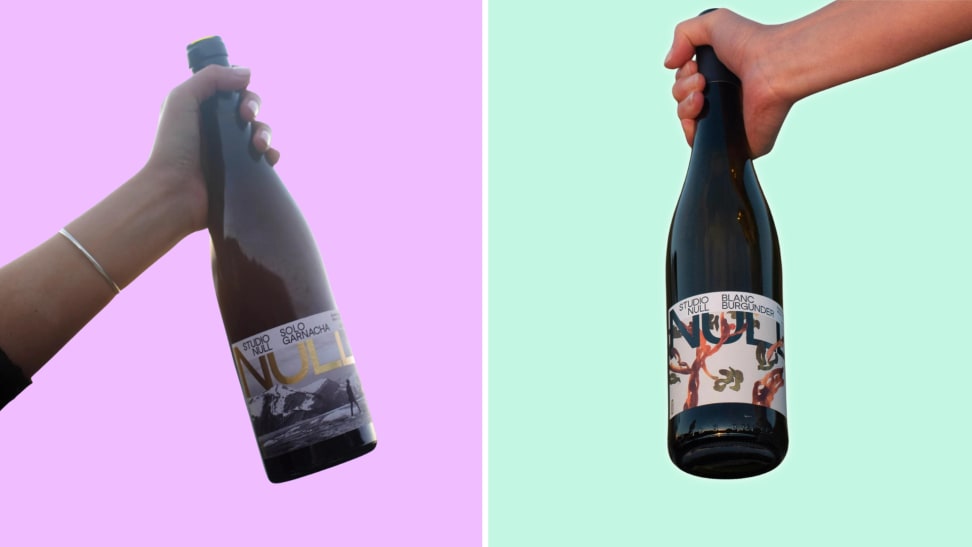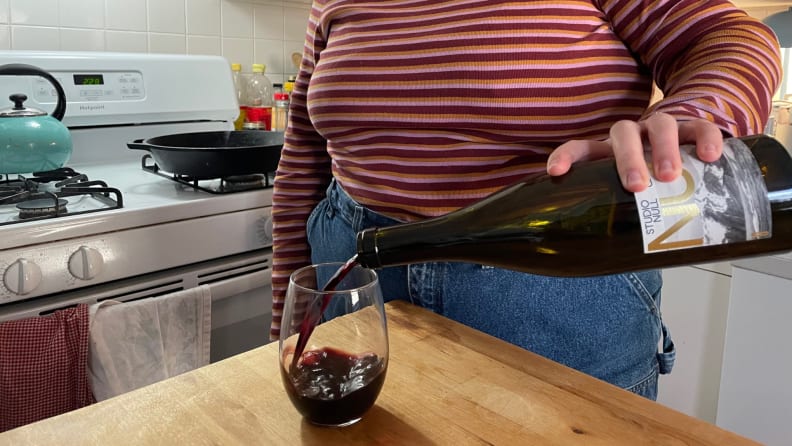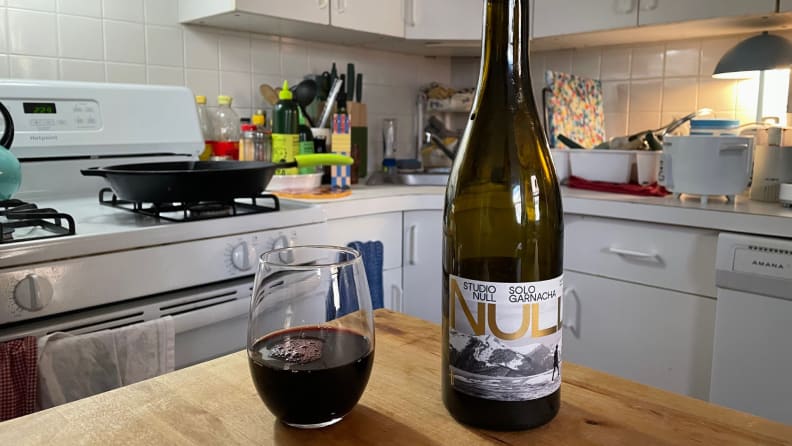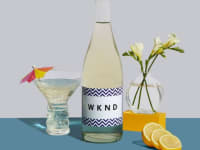Studio Null non-alcoholic wine review
This wine has lots of body but no booze—here's why to try it
 Credit:
Reviewed / Studio Null
Credit:
Reviewed / Studio Null
Products are chosen independently by our editors. Purchases made through our links may earn us a commission.
-

Studio Null Blanc Burgunder
Pros
-
It tastes like real wine
-
Made from small vineyards
-
Made from unique grapes
Cons
-
Expensive
-
Limited stockists
-
Working in fine dining instilled a deep appreciation for wine. I love discovering new and unexpected bottles, but I don’t love the headache or grogginess that accompanies a night of partaking. So over the past year I’ve dabbled in non-alcoholic options with mixed success. That’s when Studio Null’s non-alcoholic wines caught my eye.
We’re all guilty of shopping the wine store based off of which bottle has the cutest label, and Studio Null doesn’t disappoint with its illustrative design and bold text. But can you judge a non-alcoholic wine by its label?
With Dry January in full swing, finding non-alcoholic beverages is top of mind. Here’s what we think about Studio Null’s non-alcoholic wine.
What is non-alcoholic wine?

Many popular non-alcoholic wines go through a process of dealcoholization that distinguish them from grape juice.
In very plain terms, wine is essentially alcoholized grape juice. So isn’t non-alcoholic wine just grape juice? Not exactly.
Some non-alcoholic wines like Proxies by Acid League are blends of fruit juices, teas, botanicals, and bitters so they never go through a traditional wine making process.
Other wines like popular brands Surely and Fre non-alcoholic wines, are de-alcoholized wines.
Besides developing alcohol during the winemaking process, the wine is fermented and aged, which gives it its unique flavor profiles. De-alcoholized wines go through the traditional winemaking process, but afterwards most of the alcohol is removed from the wine.
De-alcoholization can happen through two different methods. There’s vacuum distillation, which is when the wine is put in a vacuum and heated to a bare simmer (no higher than 95 degrees Fahrenheit). The suction from the vacuum lowers the boiling temperature of the wine meaning that the wine doesn’t need to be heated as high to burn off the alcohol. When wine is cooked it removes much of the flavor we come to expect in a glass of wine so minimizing its exposure to heat is crucial.
There’s also reverse osmosis that can be utilized in wine de-alcoholization. In this process, wine is forced through a membrane, which separates the wine into two parts: a highly concentrated wine and an alcohol and water compound. The water and alcohol compound is then heated to burn off the alcohol so you’re left with just water, which is then added back to the concentrated wine.
About Studio Null
Studio Null is a wine purveyor producing bottles of non-alcoholic wine from classic crisp white blends, rich reds, sparkling rosés, and more. While it doesn’t grow its own grapes, Studio Null sources the grapes from organic vineyards across the globe from Spain, Germany, and California.
With the grapes, it makes full-alcohol wines using traditional wine-making techniques. Once those wines are finished, they are de-alcoholized and adjusted using sugar, sulfites, and carbon dioxide to balance the flavor and maintain freshness.
Studio Null wines have about .5% ABV, so they are not completely alcohol free. However, this alcohol percentage is minimal and relative to the amount of alcohol in kombucha. For this reason those who abstain or can’t consume alcohol, as well as pregnant people, may need to avoid any de-alcoholized wine.
What we like
It actually tastes like wine

Great taste, variety, and transparent sourcing make Studio Null's wines a worthy non-alcoholic option.
Finding a bottle of non-alcoholic wine that actually tastes like wine is like finding a needle in a haystack. While some bottles are sickly sweet or taste like a lukewarm bottle of juice, Studio Null’s wines taste like a proper glass of wine.
I tried Studio Null’s white Blanc Burgunder and red Solo Garnacha. Null’s Blanc Burgunder is a blend of pinot blanc and pinot gris grapes. It was delightful, and I found it crisp and refreshing. It paired perfectly with the Indian food takeout I enjoyed alongside it.
Where I find some non-alcoholic wines fall flat and are too sweet, the Blanc Burgunder has the right balance of acidity that makes it perfect for enjoying alongside food.
The Solo Garnacha tasted similar to other red wines made from grenache grapes—red fruits on the palette with a dry finish.
The flavor of both wines falters on the same point—the finish falls a little flat. The best way to describe what they’re missing is the taste of alcohol. If you’re not a fan of the taste of alcohol, this will be perfect for you; however, some sippers might feel like something is a little different.
It offers a wide range of varietals
You can find bottles of non-alcoholic wine in popular types like cabernet sauvignon and pinot grigio, but Studio Null has some unique offerings. For fans of natural wine who like to be adventurous with the selection of wine they drink, Studio Null is a fantastic option.
It offers non-alcoholic wines made from lesser known grapes like verdejo, tempranillo, syrah, and pinot gris.
It has transparent sourcing
On every bottle of Studio Null’s wines it lists the name and location of the vineyard where the grapes were grown. I love this approach since it allows enjoyers of Studio Null’s wines to know where their wine comes from.
Call me a nerd, but part of what I love most about being a wine drinker is learning about the makers behind the wine. I find the nuances in the growing and winemaking process to be fascinating. Since many non-alcoholic options are mass-produced, you don’t get as much information about the makers behind the wine.
What we don’t like
There are limited stockists
I love the routine of stopping at my local wine shop to pick up a bottle for dinner. On nights where I want a non-alcoholic wine, my go-to would be a Studio Null, but unfortunately, it's not stocked as widely.
Its wines are primarily available on Studio Null’s website. Studio Null also has stockists at in-person retailers across 10 states so unless you’re lucky enough to live near one of the stockists, you’re going to have to plan ahead to keep some bottles of Studio Null on hand.
It’s pricier than most non-alcoholic wine
Contrary to popular belief, I don’t believe a good bottle of wine should cost you an arm and a leg. In fact there are plenty of affordable options under $20 so you won’t have to break the bank for a weeknight dinner pairing.
Studio Null’s wines start at around $27 and run as expensive as $36. These bottles may be extravagant for those used to spending $15 on wine, however, these high prices aren’t unusual for non-alcoholic options.
When we tested non-alcoholic sparkling wine, the bottles averaged about $20, which is higher than the $13 prosecco you may be used to. Since de-alcoholizing wines requires an extra step before the wines are ready to be bottled, the prices are going to average a bit higher, so it’s not like cutting out alcohol is going to save your wallet if you’re instead seeking out non-alcoholic options.
Should you buy Studio Null wine?
Yes, if you’re going to spend your money on non-alcoholic wine, Studio Null is one of the best options available. It’s sourced from small vineyards across the globe and has all the complex notes you expect from wine, just minus the alcohol.
Despite its higher price, I found that among non-alcoholic wines you get what you pay for and Studio Null is worth every penny for an authentic wine option. As an alternative, we recommend Noughty Non-Alcoholic Sparkling Chardonnay, which is only $19 per bottle and still tastes exceptional for a non-alcoholic alternative.



